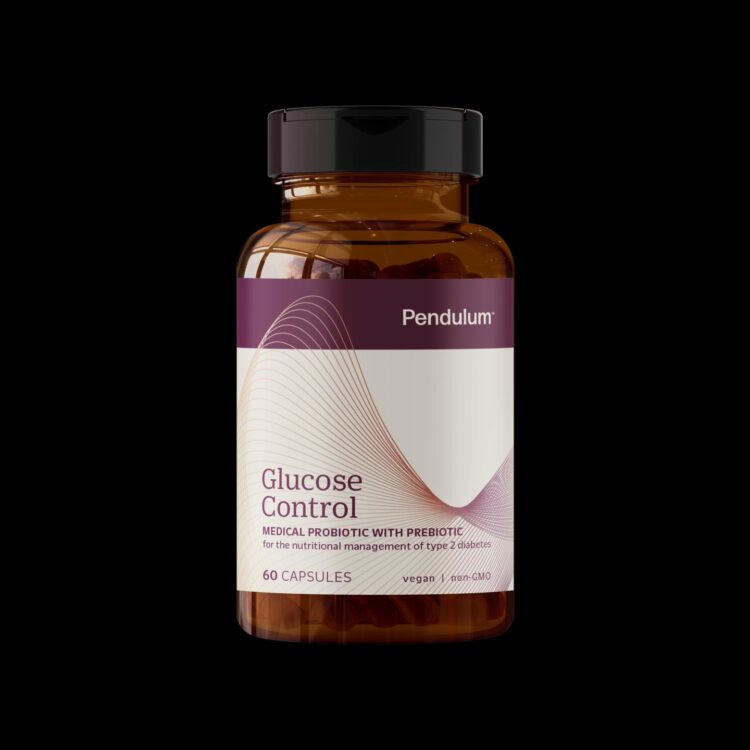Highlights how probiotic interventions can improve Type 2 diabetes management
San Francisco, CA, June 28, 2021 – A new study by Pendulum Therapeutics was presented at the American Diabetes Association’s (ADA) 81st (Virtual) Scientific Sessions, the preeminent global conference for diabetes clinicians, researchers, and professionals where cutting-edge science and advances in diabetes research, prevention, and care are discussed. The findings shine a light on proprietary probiotic formulations that may be used to help patients with Type 2 Diabetes (T2D).
The research report entitled, “Changes in Circulating Metabolites, Including Butyrate, Points to Underlying Mechanism of a Probiotic Intervention That Improves Postprandial Hyperglycemia in Type 2 Diabetes,” is believed to be the first of its kind. Its findings show Pendulum Glucose Control increases circulating butyrate and ursodeoxycholic acid (UDCA), a secondary bile acid in people with T2D, and supports the mechanism for improvement in glucose control.
According to the Centers for Disease Control and Prevention (CDC), more than 30 million Americans have T2D. New research shows that T2D is linked to an imbalance in the gut microbiome. Over time, people with T2D lose functionality of the beneficial bacteria strains that help digest dietary fiber and produce butyrate, a key molecule needed for managing insulin secretion and action, encouraging glucose regulation.
Previous studies have shown that there are three pillars to managing diabetes without the use of drugs: diet, exercise, and the microbiome. This new research helps explain why microbiome management is critical to keeping blood glucose under control.
“This study, part of an ongoing series, is adding to the body of knowledge on the microbiome and its role in metabolic disease including Type 2 Diabetes,” said Orville Kolterman, MD, Chief Medical Officer at Pendulum Therapeutics and Principal Investigator of the study. “This data builds upon the research Pendulum Therapeutics presented at ADA’s 79th Scientific Sessions two years ago. Our initial presentation showcased the efficacy of Pendulum’s proprietary microbiome synbiotic formulation (Pendulum Glucose Control) and its ability to improve glucose control in patients with Type 2 Diabetes. This newest data will further inform the development of a portfolio of products that target the microbiome as a pathway to augment the dietary management of impaired glucose metabolism and other metabolic diseases.”
Pendulum Glucose Control, Pendulum Therapeutics’ ground-breaking, flagship product, is featured in the American Diabetes Association’s selection of thought-leadership videos that will debut at ADA’s 81st Scientific Sessions.
“The microbiome is proving to be an exciting and provocative area of study. Multiple studies to date point to the microbiome’s integral role in disease management,” said Colleen Cutcliffe, Pendulum’s Co-Founder and Chief Executive Officer. “At Pendulum Therapeutics, we are committed to a methodical, rigorous, science-based approach to developing microbiome interventions. These data are affirming as we continue to pursue a portfolio of products to improve overall health.”
###
About Pendulum Therapeutics
Pendulum Therapeutics believes probiotics – developed using evidence-based microbiome science and DNA sequencing – can help heal the body from within. Armed with nine patents and five pending, the company introduced its flagship product Pendulum Glucose Control in 2020 and demonstrated its efficacy in lowering blood sugar spikes and reducing A1C in a published clinical trial. Founded in 2012 by a diverse team of scientists with deep microbiology, biochemistry, computational and clinical expertise, Pendulum has raised $105 million to date from Meritech Capital, Sequoia Capital, True Ventures, Khosla Ventures, AME Cloud Ventures, and Mayo Clinic among others. Pendulum Therapeutics is headquartered in San Francisco.
Media Contact
Stephen McCauley
[email protected]





